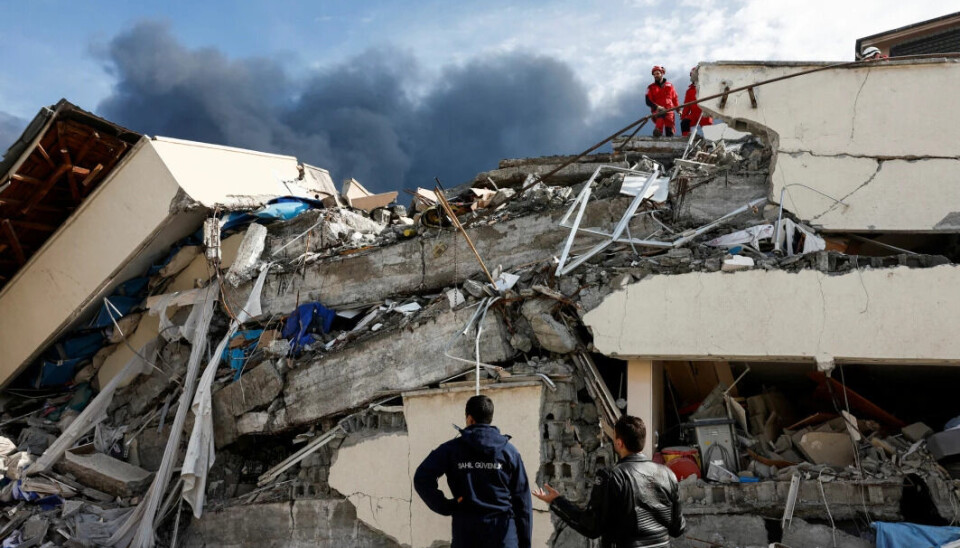
Are there more earthquakes during a full moon?
ASK A RESEARCHER: The Moon steers the tides. But does it affect earthquakes, too?
There was a full moon on Sunday night. Just a few hours later, the devastating earthquake struck southeast Turkey. Is there any connection?
“Tidal bores also affect the Earth's crust,” a reader writes. They wonder if it is generally the case that earthquakes are associated with a full moon.
Disagreements among researchers
Internationally, the researchers disagree.
“There is no evidence that the rates of these great earthquakes are affected by the position of the Earth relative to either the Moon or the Sun,” according to researcher Susan E. Hough of the U.S. Geoloical Survey.
Ruyu Yan and colleagues at the Chinese Academy of Sciences recently published an article in Geodesy and Geodynamics. In it, they wrote that an increasing number of studies show that the tides are connected to earthquakes.
The Moon is not the reason
Odleiv Olesen is a researcher at the Geological Survey of Norway. He refers us to the seismologists.
“When we talk about underwater earthquakes, you would think that the water column above a potential earthquake would change with the tides. It might compensate for the forces a little because the water rises when there is a full moon or high tide,” he says, but emphasises that this is not a field he has researched.
Lars Ottemöller, on the other hand, has researched this field. He is a professor at the University of Bergen and head of the Norwegian National Seismic Network.
“I have seen studies about this. But the forces that cause earthquakes come from tectonic movements,” he tells sciencenorway.no.
In some places, the Earth’s tectonic plates collide, in other places they drift apart.

May affect timing
“What some are wondering is whether small changes in atmospheric pressure and tidal stress can have a small effect and be what triggers an earthquake. In other words, the tide does not cause earthquakes, but perhaps it can have an effect in starting one,” Ottemöller says.
This means that the earthquake will come regardless, but that moon phases and tides may contribute to the earthquake coming on Monday, and not next Thursday or another day not long from now.
“But perhaps not in this case. Large earthquakes like the one in Turkey are quite complex. It is not possible to say exactly why it started this time,” he says. “The deformation builds up over a long time, and there are great forces at work. At some point it becomes so large that it cannot withstand the forces any longer, and the earthquake begins. It may be that small outside factors can contribute to it starting, but they are not what trigger the tremor in the first place.”
“Hardly relevant"
At the research foundation Norsar, Head of Research Volker Oye is in a hurry to answer questions about the earthquake in Turkey. He is also aware of the theory that there is a link between moon phases, tides and earthquakes.
“There are some who believe that they are connected, but I am not convinced that it is statistically relevant. I know that there is someone in California who has compiled statistics, but I have not familiarised myself with them,” he says. “The main ingredient in an earthquake is the tension that builds up. So maybe the moon phase adds to the tension. But it is doubtful that it is the deciding factor.”
Some of the research articles on the topic can be found below the article.
———
Translated by Alette Bjordal Gjellesvik.
Read the Norwegian version of this article on forskning.no
References:
Ide et al. ‘Earthquake potential revealed by tidal influence on earthquake size-frequency statistics’, Nature Geoscience, vol. 9, 2016. DOI: 10.1038/ngeo2796 Abstract.
Interactive map of active volcanoes and earthquakes worldwide: volcanoesandearthquakes.com
Scholz et al. The mechanism of tidal triggering of earthquakes at mid-ocean ridges, Nature Communications, vol. 10, 2019. DOI: 10.1038/s41467-019-10605-2
Suzan E. Hough. ‘Do Large (Magnitude ≥8) Global Earthquakes Occur on Preferred Days of the Calendar Year or Lunar Cycle?’, Seismological Research Letters, 2018. DOI: 10.1785/0220170154 Summary.
Yan et al. A review of tidal triggering of global earthquakes, Geodesy and Geodynamics, vol. 14, 2023. DOI: 10.1016/j.geog.2022.06.005

































